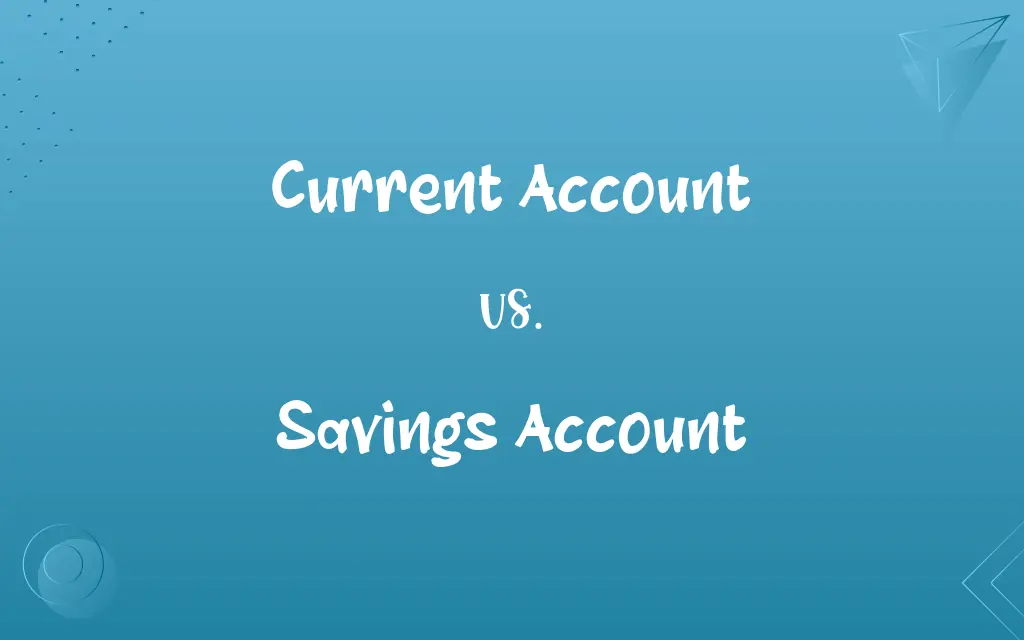Current Account vs. Savings Account: Know the Difference

By Shumaila Saeed || Published on January 28, 2024
Current Account is typically used for daily transactions, offering no or low interest, while a Savings Account is intended for saving money and generally offers higher interest rates.

Key Differences
Current Accounts are designed for frequent, daily transactions such as deposits, withdrawals, and transfers. Savings Accounts are intended for saving money over a longer period and are not typically used for daily transactions.
Shumaila Saeed
Jan 28, 2024
Current Accounts usually offer low or no interest. In contrast, Savings Accounts offer higher interest rates, encouraging customers to save money.
Shumaila Saeed
Jan 28, 2024
Current Accounts often have no limits on transactions but may have higher fees. Savings Accounts may have limits on the number of transactions and can charge fees for exceeding these limits.
Shumaila Saeed
Jan 28, 2024
Current Accounts are ideal for businesses and individuals who need to perform frequent transactions. Savings Accounts are better suited for individuals who want to save money and earn interest over time.
Shumaila Saeed
Jan 28, 2024
Many Current Accounts offer overdraft facilities, allowing account holders to spend more than they have in the account. Savings Accounts typically do not offer this feature.
Shumaila Saeed
Jan 28, 2024
ADVERTISEMENT
Comparison Chart
ADVERTISEMENT
Current Account and Savings Account Definitions
Current Account
An account typically used for deposits and withdrawals.
He transferred funds to his current account for immediate access.
Shumaila Saeed
Jan 08, 2024
Savings Account
An interest-bearing account for long-term savings.
She allocated a portion of her salary to her savings account each month.
Shumaila Saeed
Jan 08, 2024
Current Account
An account for daily financial transactions.
She used her current account to pay monthly bills.
Shumaila Saeed
Jan 08, 2024
Savings Account
A financial tool for individuals to save and earn interest.
The couple used a savings account for their home down payment.
Shumaila Saeed
Jan 08, 2024
Current Account
A non-interest or low-interest account for regular transactions.
She kept her spending money in a current account for easy access.
Shumaila Saeed
Jan 08, 2024
ADVERTISEMENT
Savings Account
An account with limited transactions, focused on savings.
They deposited their annual bonus in a savings account.
Shumaila Saeed
Jan 08, 2024
Current Account
A bank account with minimal interest, suitable for frequent use.
The business managed its daily expenses through a current account.
Shumaila Saeed
Jan 08, 2024
Savings Account
A bank account that encourages saving by offering higher interest rates.
Her savings account accrued interest over the years.
Shumaila Saeed
Jan 08, 2024
Current Account
A transactional account often used by businesses.
Their current account was essential for handling client transactions.
Shumaila Saeed
Jan 08, 2024
Savings Account
An account designed for saving money with interest.
He opened a savings account to build his emergency fund.
Shumaila Saeed
Jan 08, 2024
Repeatedly Asked Queries
Who benefits from a Savings Account?
Individuals looking to save money and earn interest over time.
Shumaila Saeed
Jan 28, 2024
What is a Savings Account?
An account intended for saving money, offering higher interest rates.
Shumaila Saeed
Jan 28, 2024
Who should use a Current Account?
Businesses and individuals needing to perform daily transactions.
Shumaila Saeed
Jan 28, 2024
What is a Current Account?
A bank account designed for frequent financial transactions with minimal interest.
Shumaila Saeed
Jan 28, 2024
Can I use a Current Account for savings?
It's possible, but not ideal due to low interest rates.
Shumaila Saeed
Jan 28, 2024
Is there a transaction limit on Savings Accounts?
Yes, many have limits and may charge for exceeding them.
Shumaila Saeed
Jan 28, 2024
Do Current Accounts earn interest?
They typically offer low or no interest.
Shumaila Saeed
Jan 28, 2024
How much interest do Savings Accounts usually offer?
Higher than current accounts, varying by bank and account type.
Shumaila Saeed
Jan 28, 2024
How do I choose between a Current and Savings Account?
Consider your need for daily transactions versus long-term savings.
Shumaila Saeed
Jan 28, 2024
Can I set up automatic payments from a Savings Account?
Generally, it's better to use a current account for regular payments.
Shumaila Saeed
Jan 28, 2024
Do Savings Accounts have higher minimum balance requirements?
Often, they require a higher minimum balance than current accounts.
Shumaila Saeed
Jan 28, 2024
Can I write checks from a Savings Account?
Typically, savings accounts do not offer check-writing capabilities.
Shumaila Saeed
Jan 28, 2024
Can I get an overdraft with a Savings Account?
Usually not, as they are not designed for this purpose.
Shumaila Saeed
Jan 28, 2024
Is it easy to access funds in a Savings Account?
Access is possible but might be limited to prevent frequent withdrawals.
Shumaila Saeed
Jan 28, 2024
Can I have both a Current and Savings Account?
Yes, many people have both for different financial needs.
Shumaila Saeed
Jan 28, 2024
Are Current Accounts suitable for salary deposits?
Yes, they are commonly used for receiving salaries.
Shumaila Saeed
Jan 28, 2024
Are online transactions easy with a Current Account?
Yes, they are well-suited for online and electronic transactions.
Shumaila Saeed
Jan 28, 2024
Are there fees associated with Current Accounts?
Yes, they can have higher fees compared to savings accounts.
Shumaila Saeed
Jan 28, 2024
How do Current Accounts handle large transactions?
They are designed to handle large and frequent transactions efficiently.
Shumaila Saeed
Jan 28, 2024
Can I use a Savings Account for emergency funds?
Yes, they are ideal for emergency funds due to easy access and interest earnings.
Shumaila Saeed
Jan 28, 2024
Share this page
Link for your blog / website
HTML
Link to share via messenger
About Author
Written by
Shumaila SaeedShumaila Saeed, an expert content creator with 6 years of experience, specializes in distilling complex topics into easily digestible comparisons, shining a light on the nuances that both inform and educate readers with clarity and accuracy.









































































